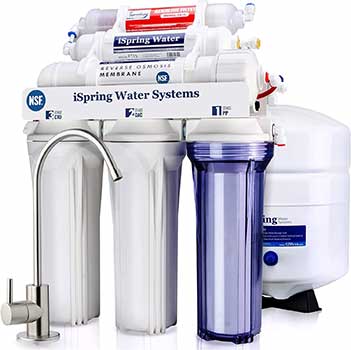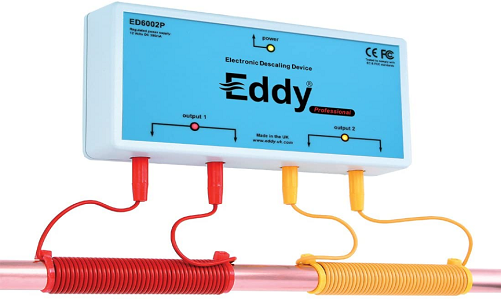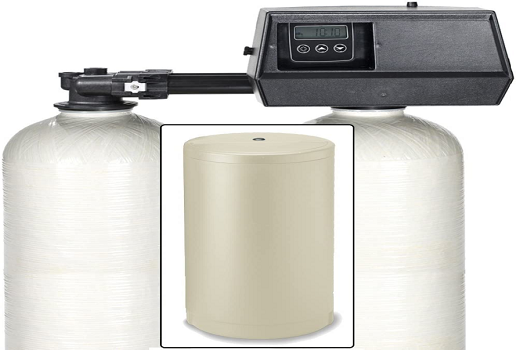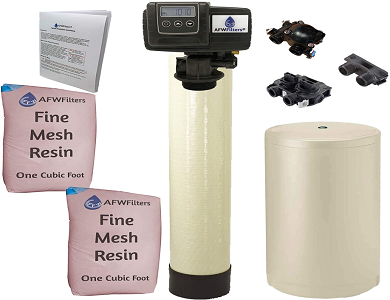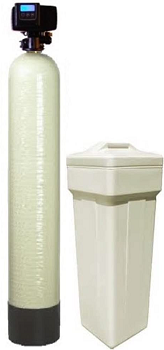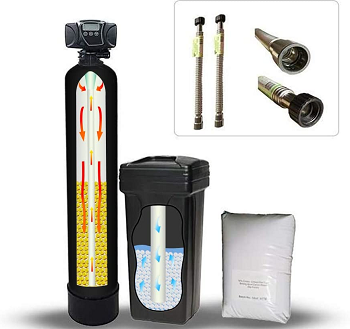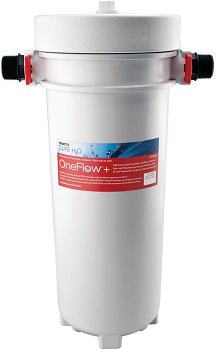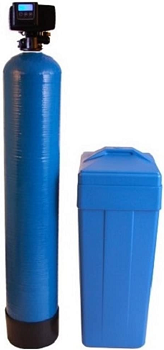Hard water is a common problem in most parts of the country. Almost 85% of America has hard water. This means; you are likely to live in a place with saltwater. So, installing a water softening system can help you to reduce the problems brought by hard water. How?
There are a lot of water softeners in the market. Probably you are asking yourself which one to choose. If this is your problem, worry no more. This is because we have the best guide that will help you get the best softener.
In the guide, we have helped you to understand what hard water is. Also, why is hard water bad and what can you do to get the soft water? Also, this article will help you get the benefits of using soft water. This will give you the reasons for getting the best water softener system.
What Is Hard Water?
Hard water is a term used to refer to water that has a lot of minerals. Such minerals include Calcium, Magnesium, Iron, and Aluminum. Also, it may have other mineral traces like iron although this depends on the location. You should not worry much because most minerals found in hard water are not harmful to your body. In fact, only aluminum is classified as harmful to your health.
Hard water forms when water passes through lime, chalk, and gypsum deposits. These hard minerals dissolve in the water hence hardening your water. The higher the mineral content in water, the harder it is. Note hardness depends on the number of calcium and magnesium content in the water. Hard water has more than 7 grains of calcium carbonate.
Hard water has pros and cons. It is safe to drink but it can cause inflation of bills in your home. So, now you are asking yourself what is the risk of the other minerals? In this article, you will learn the effects of these minerals in hard water.
Problems with Hard Water
As mentioned above, some minerals found in hard water are not harmful to your health. These include calcium which is beneficial to your health in various ways. That is the reason why we may have demineralization. During this process, water gets back the calcium minerals. However, despite the benefits, it may cause problems at high concentrations in water.
It may cause damage of water pipes and appliances
Hard water forms limescale buildup in the pipe systems, water fixes, and appliances. This is a problem common with those who use hard water in their households. A high concentration of these minerals may ruin the appearance of your appliances. Besides, it may leave stains on faucets. With the case of pipes, you may have clogging of pipes and breaking leading to leakages.
If for example, you are using tanks to store the water, you will notice some changes. When the minerals settle on the tank for long hours, they may dissolve into the tank. This may cause serious damages to your tank on the internal surfaces.
It may cause skin irritation
Due to the high mineral content in hard water, the water pH will be automatically affected. This leads to various skin problems like dryness, itchiness, clogged pores, acne. So, in case of an acne breakout, dermatologists tell you to wash your face with bottled water. This is because of the effects that hard water can cause.
Also, existing skin infections may take longer to heal. Some of the skin diseases include eczema and dermatitis.
It affects hair styling
When the water has higher mineral deposits, it makes the hair less pliable. Also, it makes it more difficult to style after washing. If you had applied dye to your hair, there are chances that it will fade faster. Besides, a high level of calcium ions changes the color of the dye. With iron and sulfur minerals, it may make it have an odor smell.
It may cause persistent stains
High mineral deposits cause grungy spots and stains on tiles, cars, and bathtubs. Also, you may notice some stains in your toilet bowl and showerheads. Also, minerals neutralize soap and detergents which means that the stain will be more. It makes the stain removal process to be a hard task. This will take an extra effort to remove. This forces you to use cash to buy expensive detergents that will help you better.
Laundry difficulties
When washing with hard water, you will experience the effects of machine performance. It also prevents water from lathering properly. This will need you to use double soap than those who use soft water.
Benefits of Water Softening System
Water softening systems help so much in removing minerals from hard water and softening it. This gives a lot of benefits that come along with soft water. Below are some of the benefits that you will get with water softening systems.
Appliance longevity: If you have water-based appliances definitely you need to consider the use of soft water. This is will make sure that your appliances serve you for a long. The best water softening systems can remove 99.9% of all hard minerals. This is regardless of how many gallons of water you are using daily. This will make sure that your appliances do not rust in case your water has iron minerals.
Water heating efficiency: Limescale adds layer-like insulation to your heating appliances. When you soften your water, it will remove all minerals in the water. This will remove the insulating layer that forms during the heating. So, when heating, it will take less time to help you to cut down the electricity bills.
Water flow rate: Softened water does not have calcium minerals known for forming lime-scale. I mean, it will not have any deposits forming on the pipes. This gives a free flow of water in the pipes.
More efficient cleaning: Soft water forms lather easily with soap. So, you will use less water when washing your dishes and clothes. Also, you will save a lot of money you use to buy expensive detergents. You will use fewer gallons to achieve the same results. Another advantage is that you will not get some cloudy residues on your surfaces.
Lime and Stain-free surfaces: If you have ever used hard water in washing you can tell that the stains left on surfaces are not appealing. Stains on sinks, bathtubs, faucets, and showerheads look ugly. When you get a water softener, you will not need to keep wasting time cleaning these surfaces. This is because limescale is not formed with soft water. You will always have stain-free surfaces that take less time to clean.
Skin and hair: As mentioned earlier, hard water causes skin irritation. This is not to all people but some. Also, if you have skin problems, you will likely be more affected by the hard water. A water softener reduces the pH value of the water. So, when you come into contact with soft water, it will not irritate your skin.
Also, soft water brings a pH balance between the dye and the water. This helps it to maintain moisture and smoothness. It would be better to get a water softener that removes hard minerals up to 99.9%. This helps you to wash your hair more effectively maintaining its condition as before.
How Do Water Softeners Work?
There are different types of water softeners available for use. Mainly, there are two categories; salt-based and salt-free. Both have different variations in how they work. Also, based on those two categories, there are a lot of brands available in the market. Each uses different components and techniques to remove the hardness from the water. So, because of those scenarios, there is no single way you can describe how a water softener works. The only simple way is to determine singly each type of water softener.
Most Popular Type Water Softeners
Below is the list of popular water softeners and how they work;
1. Salt-Based Water Softeners
One common method that people use to soften water is the ion exchange system. This process involves exchanging calcium and magnesium with sodium (salt) ions. A salt-based system needs to have a special type of ion to run. Note that table salt is not used in this case.
Saltwater softeners have resin beads with a negative charge. The magnesium and calcium have a positive charge. You know that opposite charges attract. So, when water is passing through the resin, the ion exchange happens. The collected water will not have magnesium or calcium ion. The water we get at the end is soft as it contains no minerals.
- It quickly delivers results.
- It is affordable in the long term.
- Removes all the hardness levels out of the water leaving no trace of magnesium and calcium.
- It is NSF certified so you do not need to worry about its effectiveness.
- It is so beneficial in a manner that it reduces the build-up of scale in your water-based appliances.
- May increase the sodium content in the water. Everyone wants salt-free water which is not the case with water-based systems. You will need to add salt to it.
- Needs you to clean the resin and add salt frequently.
2. Salt-free Water Softeners
This is the opposite of salt-based water softener systems. Unlike them, the salt-free water softener uses a template-assisted crystallization TAC media. It changes the ion composition of the ions in a way they are not capable of forming lime-scale in surfaces. This type of softer de-scales water but does not soften. This means that it does not remove the minerals inside.
- You can still enjoy the nutritional value of these hard minerals. This is because they are not removed during the softening process.
- It is cheap.
- It has minimal maintenance and comes with everything you need to get started. Also, you do not need to do the in-depth installation.
- Getting the best softener in the market, you will have low power consumption. This is because it uses less electricity besides being environmentally friendly. You can actually use it with people who are on a low salt diet.
- Prevents lime-scale in pipes and stains on surfaces.
- It is not suitable in areas where salt is 75 grains per gallon.
- Slower than salt-based systems.
- You may notice issues with skin, hair, and laundry too.
3. Dual tank water softener
It is also known as a twin tank water softener because it is a salt-based softener with two resin tanks. The two tanks have the same function as the single tank. The only difference is when one tank is in regeneration, the other tank provides water. Most families do not need these two tank softeners. This is because they are too expensive. Also, it is not easy to install them. However, if you succeed in installing it, you are sure your household will never run
- They are so effective.
- They have a large capacity. This ensures that you will have a constant flow of softened water.
- It does not have off time. There is continuous regeneration of soft water as the other tank is storing the other.
- It is expensive to acquire and install
- It increases salt intake as it does not remove minerals completely.
4. The Electronic/ Magnetic Water Softener
The electric water softener is most recommended because it occupies less space. You will only place it on the pipe which does not occupy any space. The magnetic softener does not remove the heavy minerals in the water. Instead, they work using magnetic fields to strip the negative and positive ions. This is a way of neutralizing the strength of the minerals in the water.
So, once the neutralization takes place, it means that the ions cannot bond together. They will now remain soluble in the water. This is one of the affordable solutions to your hard water. It is a reliable type of water softener that you can find in the market.
- It has easy installation as you will only attach it to the pipe.
- Easy to maintain, unlike salt-based where you need to add salt and change resins.
- It prevents lime-scale and stains. This is so because all the minerals are neutral and so cannot react with surfaces whatsoever.
- It is cheap.
- Do not prevent the build-up in appliances.
- It is slow to deliver, unlike salt-based softeners.
Best Water Softener System
1. iSpring RCC7AK 6-Stage Under Sink Reverse Osmosis Drinking Water Filter System
iSpring RCC7AK 6- stage water softener is one of the best for those who have wells in their home. This softener uses reverse osmosis to remove harmful contaminants. Before releasing the water to the pipes, it replaces beneficial minerals in the water. This is because of the Alkaline Demineralization that does the beneficial mineral restoration. If you use a fridge, you can connect it next to your fridge. You do not need a professional to install it for you. It is NSF and ANSI 58 certified. It removes 99% of 1,000harmful contaminant occupancy. Also, it has a beautiful European-Style kitchen faucet that is transparent. The housing helps in visual inspection. The manufacturer gives lifetime support when you get it.
- It is of high quality.
- Easy to install.
- Lifetime customer support.
- It restores the important minerals to the water before releasing them to the pipes.
- It is expensive.
2. Eddy Electronic Water Descaler. (Best with well and tap water)
Eddy Electronic Water De-scaler is a salt-free softener alternative. It is good for both tap and well water. It retains all the minerals after de-scaling. Eddy Electronic gives the water the soft water nature and does not change the hardness. This is healthy because it does not take away all the minerals beneficial health-wise.
It has two coils that surround the incoming water pipe. They do send electromagnetic waves through the coil to the pipes. These help in the alteration of the mineral ions’ composition. This is so because of the magnetic field subjected to the water. The composition of the mineral’s buildup alteration destroys the mineral’s structure. It requires little to no maintenance compared to a salt-based softener.
- It is small and compact.
- Little or no maintenance.
- No chance to clog.
- It retains beneficial minerals.
- No ideal in areas with high mineral content water.
- Does not alter the water pH
3. Abundant Flow Water WS-48k-91SXT 9100sxt complete softener, Almond
This is the best softener if you have water with lots of iron. It is the best softener with iron water. It has two tanks that mean that you will not run out of water during regeneration. Abundant Flow Water WS-48k-91SXT 9100sxt is a better choice for those with large families.
It is a heavy-duty softening system. It can remove up to 48,000 grains of hardness. This is good as it will make your home activities like laundry efficient. It is easy to install. The manufacturer says it can take you 1 to 2 hours to install.
- Easy installation.
- It is good for large families
- Good for laundry water.
- Has two tanks assurance of continuous water supply.
- Removes minerals beneficial for health
4. Iron Pro 2 Combination water softener
Iron Pro 2 is one of the best salt softeners and iron filters. It is best if your water hardness is up to 70 GPG and iron. The product is not certified but has got a lot of customer reviews. It is an alternative for Fleck 5600sxt with added iron filtration. It has a 32,000-grain softener capacity even though it has a capacity of 80,000. This means that it falls short of 48,000-grain softener capacity.
It can remove up to 8 ppm of iron while softening water for a whole home. It includes all the tools needed for installation.
- It has both a water softener and an iron filter.
- Has a digital control head to monitor the softening cycles.
- Clean black appearance.
- Not easy to install.
- It is heavy.
5. DuraWater 64k-56sxt-10al 64,000 grain water softener, Almond
DuraWater water softener has a large grain capacity of 64,000. It is a good investment when you have a large family. It has a digital LCD monitor that allows you to customize the regeneration to suit you. Also used to display errors and help in troubleshooting. It removes minerals such as magnesium, calcium, and some traces of iron, it is best in removing salts. It is easy to install as it comes with everything packaged. Also, it comes with a bypass valve.
- It is easy to install.
- Good for laundry water.
- It has a LCD screen that helps in troubleshooting
- It is expensive.
6. Fleck 5600SXT 64,000 Grain Water Softener System
Fleck 5600SXT is one of the best water softening systems. It has an electronic metered demand control valve. This gives you a correct and accurate way when metering. Fleck 5600SXT is the best when it comes to salty water. It has the smallest space occupancy. This means you can use it even when you do not have enough installation space. Besides it has a 15 x 17 Brine tank float assembly for removing the calcium and magnesium from the water. It has a newly upgraded 10% resin which is cross-linked that is durable as compared to most types. This helps in removing chlorine minerals from the water. It is easy to install it with an average installation time being 2 hours.
- It is easy to install.
- Has an electronic meter for easy customization.
- It good for softening laundry water
- It is expensive.
7. Watts Premier OFPSYS Whole House OneFlow
Watts Premier OFPSYS Whole is a salt-based water softening system. It is one of the best with reducing the scale buildup in pipes and appliances. Also, it helps in removing the harmful contaminants which give the water the best taste. It has a template-assisted crystallization (TAC) technology that prevents mineral buildup. It has a high-capacity 20-micro water filter that removes chlorine taste and sediments. You can easily install Watts Premier on the floor or mount it on the wall.
- It does not need electricity.
- Does not need regeneration.
- It is efficient
- TAC that prevents scale buildup
- It easily breaks.
8. AFWFilters Fleck 64k water softener, 64,000 Grains, Blue
AFWFilters Fleck 64k water softener is best with salty water. It helps in removing minerals like magnesium and calcium. It has a tank durable for 10 years and a valve that can last for 5 years. The advantage of this softener is toll-free tech support on tech. This will help when you get stuck on the issues of installation and programming. It has an Upgraded Paddle Wheel Meter for adjusting the regeneration the way you prefer it. The kit comes with the installation instruction from the manufacturer. It has a Fleck 5600SXT digital meter also which has fully programmable cycles.
- Customer support when installing and programming.
- The installation kit has all you need to install.
- It is efficient
- It needs high maintenance.
Features to Keep in Mind Before Buying A Water Softener
Before you buy a water softening system, it is good to put into consideration some features. This is regardless of home or business softener. It is always recommendable to know what you are looking for. This is on the basis of the size, budget, softening needs, etc.
Look at some of the features that you should consider before you choose a water softener.
Capacity
Water softener’s capacity is the number of grains per week that a unit handles before you replenish. Different water softeners on the market vary in grain capacity from model to model. This means some softeners can produce more soft water and at a good rate than the others. Small water softeners have got a capacity of 16,000, 24,000, and 32,000 weekly grain capacities. Medium water softeners have grain capacity ranging from 40,000 to 64, 000. If you have a big family or business, you will need to have grain capacities of 80,000 and 100, 000.
Note that the harder your water is, the more grains the system will use. If you want to upgrade, look at the grain water softener you have. It is different how a 48,000-grain system will handle 3 GPG water and 10 GPG water running through it.
Technology type
There are various technologies used in softening water. You may prefer to use a salt-based softener if the water has high mineral content. Also, you may choose to change the composition of the ions and not remove them. The target here may be preventing the water from forming lime-scale build-up. In that case, you will opt for a salt-free softener. This concludes that there is no better water softener if it is in line with your preference.
Installation and Maintenance cost
The technology used to build the softener affects the initial maintenance costs. In general, buying a salt-based softener is more costly than a salt-free softener. The installation of each water softener varies depending on the manufacturer. So, this may cost you to spend more than you would expect. This is regardless of salt-based or salt-free softener.
It is worth paying more to get the best water softener system that is efficient and durable. However, if you feel that the price tag is not worthy, you should avoid it.
Area available to house the unit
Before you buy the water softener, it is good if you determine the type of system you are going to buy. This will help to know if you have the space needed to install the softening system. Make sure you have the correct measurement of the place as this will help you when looking for space to install. If for instance, you do not have space to house it, change your choice and get the alternative of that.
Bypass valve
We use a bypass valve to switch off the water supply to the softener. This happens while allowing it to flow in your household pipes and in the appliances. The bypass is important in several ways. You may need to cut off water to maintain your water softener. Also, you can divert water away from the water softener while it is in its regeneration cycle.
In most cases, the softener will come with a bypass valve. However, if it does not have one, look online for the one that best fits there. You will need a bypass valve if you have a salt-based softener. Additionally, it is good if you will have a salt-free softener valve too.
Certifications
The best water softeners for homes or businesses have certification. This is from the Water Quality Association or NSF International. However, it is not a legal requirement. Its importance is to give you the confidence that you are buying a legit product. Also, it assures you that the system can remove the hard minerals from the water.
Note that salt-based systems can achieve WQA or NSF international certification. But it may be difficult to test the credibility. This is because the water conditioners may not remove the hard minerals. So, this is the reason why WQA and NSF International do not certify water conditioners.
How to Install A Water Softener System?
Water softener systems are quite simple to install. You will not need a plumber to help you do the process. However, different types are different processes to install. So, if you have not bought one and you want to install it, here is a step-by-step process to do so;
- Get a strategic location where you will install the softener in the home or business premise. Ideally, the best point would be at the water entry point. This means you will be able to soften it before you supply it in the entire home.
- Make sure that the incoming pressure is between 40 and 70 PSI. The minimum pressure should be 30 PSI with the highest being 120 PSI.
- Turn off the main water supply and make sure that you drain all the pipes. This is achievable if you open the valve at the lowest point in your installation place.
- Turn off the water heaters and also ensure that the power leading to the heater is off.
- Use a pipe cutter to cut the mainline where you will position the softener.
- Install the elbow fitting that will feed the water to the filter. Use the bypass valve to divert water when you are maintaining the filter. Use compression fittings to attach the unit fitting.
- Install and clamp the hose to the unit. You should make sure it feeds where the water drains.
- Install the overflow tube to the brine tank.
- Adjust the bypass valve to divert the position. Flush it with water to remove any sediment lingering inside.
- Plug your unit and return the valve to the backwash position. You will need to open the valve slowly to pass through in portions. This will help to remove the air inside the pipes. Remember this is as per the manufacturer’s instructions. When you are through, you will have softened water in your house.
How to Maintaining Your Water Softener System?
The reason why you need to maintain the softener system is for efficient work and long life. So, if your water softener is not working, here are the best maintenance measures you can take and improve it.
- Cleaning your salt tank: Cleaning the water softener salt tank occasionally will remove any dome build-up inside. Mostly this is due to the addition of too much salt. You can easily clean it by breaking up the salt crust and removing it. You can set a routine for example after every three months.
- Cleaning your resin bed: This is necessary especially when the water has a lot of iron content. Note that the iron can damage the resin bed responsible for removing the hard minerals in the water. You need to run the iron rust remover. Make sure you use the correct number of products as recommended by the manufacturer.
- Cleaning the resin tank injector: Your resin tank injector will clog because of the sediments passing in it. This will prevent it from working properly. So, if you want to clean it, bypass the water from the tank. After this, regenerate the tank manually.
FAQs – Frequently Asked Questions
Can I use potassium chloride as salt in my softener?
Yes, you can use potassium chloride in place of the salt in your softener. It will perform the same function as sodium can do. This means it is a good alternative for sodium during the softening process. This can help you if you are on a low sodium diet.
Why does my water softener smell bad?
There are two reasons why softeners can smell bad. If you start getting a rotten egg smell chances are there is a sulfur bacterium build-up in the brine tank. The sodium attracts the bacteria that release hydrogen sulfide. This gas causes the rotten egg smell. Besides, you may notice a rust-like smell which may be iron content in the tank. The recommendation is to run a de-rusting agent in your tank to prevent the build-up.
What is the difference between a water softener and a descaler?
They both perform the same task. However, water softener removes calcium and magnesium and replaces them with sodium. On the other side, the descaler does not remove calcium and magnesium. It alters the composition of the minerals. Also, it renders them incapable of forming limescale buildup in pipes.
Is soft water bad for copper pipes?
Soft water simply means water without minerals. Due to this state, it may draw minerals from the surroundings and over time it will cause leaks. Note that it is normally produced when hard water runs through a softener. Before returning to a neutral state, it had mineral abundance. At this state, it neither wants any minerals, so it is safe for your pipes.
Conclusion
There are a lot of factors to consider when you are buying the best softener for your home. As said, anything that meets your preference is the best for you. However, before you purchase it is good to spend time and do good research to avoid future frustrations.
So, after the review of the best softener in the market, these are the best water softeners that you can get. The recommendation is according to the type of water softener you may be looking for. If you want a whole house salt-less softener, Eddy Electronic Water Descaler is the best. If your choice is salt-based, the iSpring RCC7AK 6-Stage model is the best. But, if you want a salt-free and filtration system, the Iron Pro 2 Combination water softener is the best. Remember to always consider quality when buying a water softening system.
Recommended Post:

